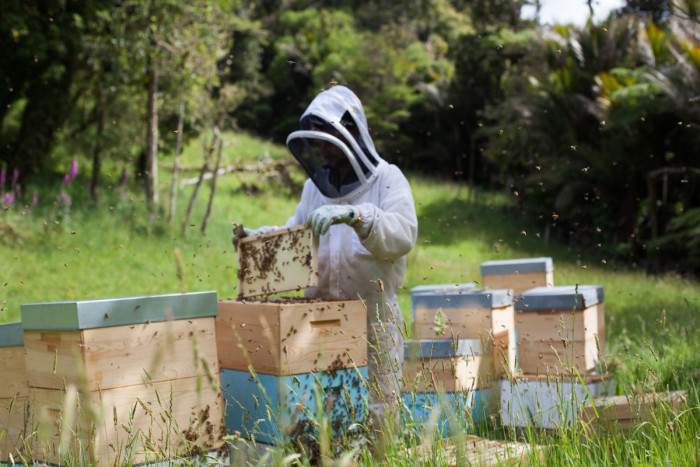Beekeeper
Kaitiaki Pī
Alternative titles for this job
Beekeepers look after beehives in apiaries that produce honey, wax, pollen and other bee products. They may also offer pollination services to horticultural and seed crop producers.
Pay
Beekeepers with up to four years’ experience usually earn
$49K-$70K per year
Beekeepers who manage apiaries usually earn
$65K-$120K per year
Source: Apiculture New Zealand, 2019
Job opportunities
Pay
Pay for beekeepers varies depending on experience, responsibilities and how many hives they look after.
- Beekeepers with no experience usually earn minimum wage.
Beekeepers with one to four years' experience usually earn between minimum wage and $70,000 a year.- Beekeepers who manage staff and apiary operations can earn between $65,000 and $120,000.
Earnings for owner-operator beekeepers depend on the number of hives they manage and their income from pollination services and honey production.
Source: Apiculture New Zealand, 2019.
- PAYE.net.nz website - use this calculator to convert pay and salary information
- Employment New Zealand website - information about minimum wage rates
(This information is a guide only. Find out more about the sources of our pay information)
What you will do
Beekeepers may do some or all of the following:
- collect honey from hives and extract honey from combs
- transport hives to various locations
- inspect hives and treat them for diseases or parasites
- ensure bee colonies have enough food
- provide pollination services by renting hives to orchards and farms
- breed queen bees
- build and maintain hives
- package honey and honey products for processing
- run their own business and keep records.
Before buying your own hives, you need to get experience so volunteer or start working with a local beekeeper.

Priscilla Thompson
Beekeeper
Skills and knowledge
Beekeepers need to have:
- knowledge of the yearly cycle and habits of bees
- good bee handling skills so they know when and how to approach bees
- knowledge of plant types and life cycles, and how and when plants produce nectar
- skill in identifying bee diseases, and knowledge of methods of disease control
- knowledge of how to extract and assess the quality of bee products such as honey, pollen, royal jelly and propolis
- carpentry skills for building and repairing hive boxes.
Beekeepers running their own business also need small business skills.
Working conditions
Beekeepers:
- work long and irregular hours in the peak summer and autumn seasons
- work in honey houses and workshops, and outside on farms and orchards
- often have to work outdoors in all types of weather, and will sometimes get stung by bees
- may travel long distances between hives.
What's the job really like?
Priscilla Thompson
Beekeeper
Being outside with the bees is the best part
For beekeeper Priscilla Thompson, there’s no better job than being out in the fresh air with the bees.
“You’re not in an office all day, you’re on your feet keeping fit. Some people flinch at the idea of getting stung – bee stings aren't great at first, but you get used to them, and bee venom is your free preventive joint care!"
Focusing on keeping hives healthy
“My sister and I regularly get up early to check and record the health of the hives. We use an organic thyme ‘jelly’ on cardboard strips to prevent bee viruses.
"It’s important the queen’s got enough food and she’s laying eggs. If she’s missing – you’ll hear a different buzzing sound in the hive – we’ll replace her with a new queen we’ve bred."
A lot to do and learn
“You can always learn from the bees if you’re interested in nature. It’s amazing the way they work together in so many complex processes like making wax and propolis.”
There’s a lot of activity running a small business too.
“We produce, pack and sell honey at the local market and do the marketing. In the future I’d like to promote our honey to skincare companies.
“And we’re always looking to be more sustainable – we’ve installed solar panels in our processing shed to keep the power bills down, and are encouraging customers to bring re-usable jars.”
Beekeeper video
Blanche Morrogh talks about how her beekeeping whānau and community lie behind Kai Ora Honey's success – 1.33 mins. (Video courtesy of Ministry of Foreign Affairs and Trade)
Who would have thought that, you know, six kids from up in Te Hapua that were raised in a house that had no power and gravity-fed water whereas now, we're sharing what we have learnt with the world.
So I guess for Kai Ora, the trickle-down effect into our small community is significant. One of the things that we never forget is where we come from. The people who have supported us to get here. And that is our community, that's our whānau, our hapū, our iwi.
If I ever go to have talks to our rangatahi (young people), generally I want to talk about courage. I want to talk about determination. I definitely want to talk about being proud of where you are, and who you are and where you come from.
Sobieski: Sobieski Murray, beekeeper.
Walter: Walter Murray, beekeeper.
Liam: Liam Morrogh, beekeeper.
Tae: Tae Murray, operations manager and head beekeeper.
Mabel: Mabel Murray, domestic sales manager.
Sampson: Sampson Murray, professional apiarist. Best in the world.
Blanche: Blanche Morrogh, CEO.
Entry requirements
There are no specific requirements to become a beekeeper as you gain skills on the job. However, many employers prefer to hire beekeepers who have or are working towards a qualification such as the New Zealand Certificate in Apiculture Level 3 or 4 or the New Zealand Apprenticeship in Apiculture (Levels 3 and 4).
Primary ITO oversees apiculture training and apprenticeships.
- Primary ITO website - apiculture (beekeeping) qualifications and apprenticeships
- More information about apprenticeships
Secondary education
There are no specific secondary education requirements to become a beekeeper, but agricultural and horticultural science, maths and biology to at least NCEA Level 2 are useful.
For Year 11 to 13 students, the Gateway programme is a good way to gain industry experience.
Personal requirements
Beekeepers need to be:
- motivated
- observant
- good at keeping records
- committed to working safely and cooperatively with others.
You need good relationship skills when working with farmers because now there is more competition for putting hives on their land.
Priscilla Thompson
Beekeeper
Useful experience
Useful experience for beekeepers includes:
- keeping bees as a hobby
- attending beekeeping courses
- joining the local beekeepers' club
- farming or gardening
- carpentry or other woodworking.
Physical requirements
Beekeepers need to:
- not have allergies to bee stings or pollen
- be
reasonably fit, healthy and strong because some heavy lifting is involved - have good eyesight (with or without corrective lenses).
Registration
AsureQuality registration
Beekeepers in New Zealand need to be registered with AsureQuality. Part of the registration process involves registering your apiaries.
DECA registration and inspections
Disease Elimination Conformity Agreement (DECA) training is not required, but nearly all beekeepers are expected to be DECA registered. DECA sets out a code of beekeeping practice to ensure that the incidence of American foulbrood disease in hives is eliminated.
- AsureQuality - quality assurance services for beekeepers
- New Zealand Management Agency of National American Foulbrood Pest Management Plan website - information about DECA registration and American foulbrood disease control
Find out more about training
- Apiculture New Zealand
- (04) 471 6254 - info@apinz.org.nz - www.apinz.org.nz
- Primary ITO
- 0800 208 020 - info@primaryito.ac.nz - www.primaryito.ac.nz
What are the chances of getting a job?
Good opportunities for experienced beekeepers
Employers report difficulty in finding skilled beekeepers, so your chances of securing a job are best if you have relevant experience.
The number of beekeeper businesses has increased significantly over the last five to 10 years. However, because of an oversupply of honey and a drop in honey prices since July 2018, there are currently fewer entry-level job opportunities and this is expected to continue.
Apiarist (beekeeper) appears on Immigration New Zealand's regional skill shortage list. This means the Government is actively encouraging skilled beekeepers from overseas to work in New Zealand.
Chances for entry-level beekeepers better with big employers
Entry-level beekeepers may find it easier to get a job with large companies (with 3,000 hives or more). Employers are usually hiring during the busy spring and summer seasons, between September and February.
According to the Census, 2,361 commercial beekeepers worked in New Zealand in 2018. According to Apiculture New Zealand, there were 9,217 registered beekeepers in June 2019, including hobbyists and commercial.
Self-employment common among beekeepers
Some beekeepers work for large companies that develop and sell honey products.
Many beekeepers work as owner-operators, producing and marketing their own honey or supplying honey to other companies.
Sources
- Apiculture New Zealand website, accessed August 2019, (www.apinz.org.nz).
- Immigration New Zealand, 'Regional Skill Shortage List', 27 May 2019, (www.immigration.govt.nz).
- Kos, K, chief executive officer, Apiculture New Zealand, careers.govt.nz interview, August 2019.
- Ministry for Primary Industries, '2018 Apiculture Monitoring Programme', accessed August 2019, (www.mpi.govt.nz).
- Plant & Food Research and Horticulture New Zealand, 'Fresh Facts 2018', accessed August 2019, (www.freshfacts.co.nz).
(This information is a guide only. Find out more about the sources of our job opportunities information)
Progression and specialisations
Beekeepers may progress to setting up their own hives and running their own business, or move into breeding bees, or sales and marketing roles for bee-related products.
Last updated 9 May 2025


